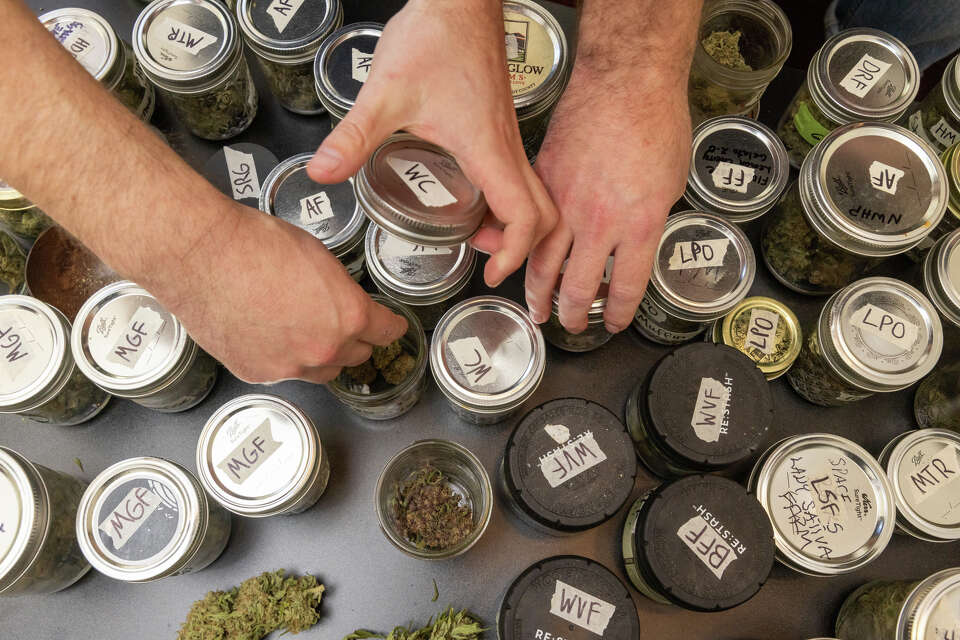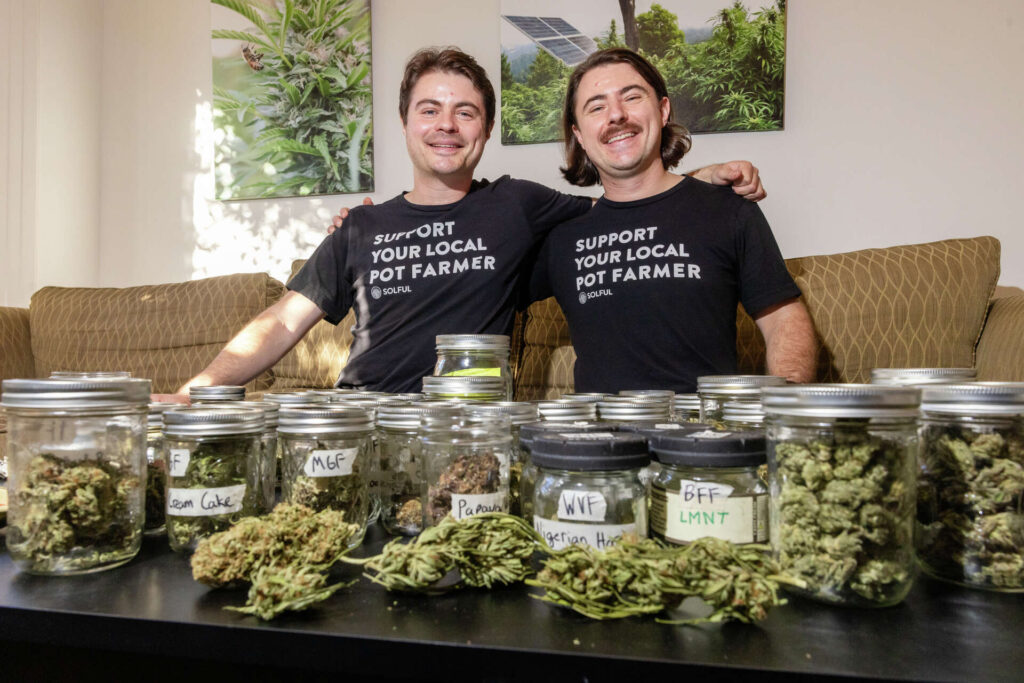It’s a typical Tuesday evening in San Francisco, which means Noah and Eli Melrod have a problem. Their home is filled with cannabis, but the brothers need to pick just one strain to smoke.
“Let’s do Slapz, it’s from Flowerdaze,” Noah says, as he reaches past dozens of weed jars sitting on his coffee table and grabs one labeled with that strain name. Eli nods in agreement, saying, “Oh, everything from Flowerdaze is killer.” Noah rolls the cannabis into a joint, and then the brothers step outside to smoke.
This may sound like a stoner’s Shangri-La, but the Melrods’ smoking habit is firmly planted in the real world. Eli is the 30-year-old co-founder and CEO of Solful, a small chain of three retail pot shops that has been operating in California since 2017. Noah joined in 2020 as the store’s supply chain manager. They say their business is growing and turning a profit, and in early October they opened a new location in Healdsburg, a picturesque town in Sonoma County’s Wine Country. In 2022, the Press Democrat hailed Eli as a “wunderkind” for bringing a refined style to retail cannabis.

Solful is still a tiny player in California’s $5 billion legal weed market, but if its growth is sustainable, then Solful would be a shining example of retail success in the cannabis world, amid family farms failing and corporate retail empires crumbling. And at the heart of this retail success story are two San Francisco brothers smoking lots and lots of pot.
‘We’re dealing with a misconception’
Eli was only 23 when he opened the first Solful dispensary in Sebastopol in 2017, although he grew up surrounded by weed. Both brothers were raised in San Francisco’s Noe Valley neighborhood and went to high school in the Haight-Ashbury, a neighborhood that’s become internationally synonymous with counterculture and cannabis.
Eli’s family was also immediately supportive of him when, at 21, he said he wanted to take time away from studying economics at Wesleyan University to explore the weed industry. He’d realized there were no cannabis retailers that looked like the bougie coffee and cheese shops he grew up around, so he decided he wanted to open a new type of pot shop that felt more like a Rainbow Grocery and less like a stoner headshop. His father, who used cannabis during a fight against pancreatic cancer in 2004 (he’s still alive today, despite doctors giving him six months to live after his diagnosis), introduced him to his favorite cannabis growers, and a family friend named Peter Dickstein, who has decades of experience at Silicon Valley businesses, partnered with Eli to help mentor him and co-found the company.

To bring his vision to life, Eli decided to flip the script on conventional retail cannabis: Solful exclusively sells cannabis grown outside, a category of pot that is widely considered inferior to cannabis grown inside warehouses under artificial lights. This “indoor” weed generally has higher concentrations of THC, the primary intoxicant in cannabis, but a vocal minority of cannabis connoisseurs say it lacks the character and effects of marijuana grown naturally under the sun. Eli agrees, and he’s a firm believer that by sourcing the best “sun grown” cannabis, he can prove that naturally grown pot is the best.
“We’re dealing with a misconception that sun grown is the cheap stuff and indoor is the good stuff. So to change people’s minds, we have to go that much farther to make sure everything is perfect,” Eli says.
To go through this meticulous process, the brothers have to smoke a lot of weed. Solful’s stores are selling 40 different varieties of cannabis flower at any given time and average 150 different batches a year, Eli says, but nothing hits their retail shelves before it gets smoked and approved of by the two brothers. Most things get denied.
“We have to be very selective. So most things get a no,” Eli says, sitting in front of a mountain of weed jars. “Which is how you end up with this whole table where … we’ll probably buy like a third of what’s on here.”

Today, Noah says, there are probably about 400 different samples of cannabis in the house they share in Bernal Heights. The weed is everywhere: on the coffee table, yes, but also in boxes in the hallway and in jars tucked into bathroom cabinets, with hundreds more stored downstairs in the garage. Once Noah pulls that “Slapz” strain grown by the farm Flowerdaze out of the pile, the brothers put it through their standardized process: First, they examine the flower bud’s structure and smell the cured flower (Eli says it’s “fruity and gassy”). Then Noah rolls a joint, always using the same Elements branded papers and never using a filter, which he says allows you to “really sip on it” and fully taste the weed. Finally, they evaluate the weed’s flavor by taking a dry hit before lighting the joint, and then smoking it to see how it tastes and feels.
Eli says “Slapz” tastes “sweet and earthy” and has a resinous mouthfeel, packing the dank flavors cannabis connoisseurs find so enjoyable. A few days later, while describing the strain’s effects, Noah says it was “very calming and happy but still alert.”
After smoking the joint outside, the two brothers head back to their coffee table to look through their jars and pick out their next strain to smoke. Noah estimates that they smoke a couple joints nearly every evening to keep up with the onslaught of samples, which registers as moderate consumption on the stoner scale but significantly more than some cannabis company CEOs, who say they won’t touch the drug.

Eli says he frequently takes days off from smoking, and only smokes at the end of the day, after he’s finished the work of running a company with 48 employees. Still, he harbors no illusions about his job: “It would be impossible,” he says, for him to be the CEO of his company and not smoke weed.
Retail expansion
Most retailers rely heavily on THC content to sell cannabis, purchasing cannabis with the highest THC levels possible based on the state’s required testing.
Eli and Noah forsake this entirely. Everything sold by Solful is lab tested, as required by law, but the brothers evaluate their samples before they look at test results for THC or terpene content. Noah compares it to buying fine wine.
“It bums me out a little bit that the industry wants everything to be a lab test,” Noah said. “Like if you’re a sommelier you don’t look at like, ‘What’s the lab test on this wine? I’m going to buy it based on that.’”

The Melrod brothers’ commitment to smoking the best weed in California appears to be paying off. While retail stores across the state go out of business, Solful is expanding, most recently opening the first dispensary ever in Healdsburg; hundreds of people turned out for the opening day. Eli says his existing stores in Sebastopol and San Francisco are profitable already and says he’s seeing double-digit growth in sales despite per capita pot sales falling in San Francisco.
Solful’s business model could help with the overall health of the industry, too. Most pot shops supply their stores by working with distributors, who give them easy access to thousands of different pot brands that can be purchased from a spreadsheet. Solful buys its pot directly from the farmer and then packages it under the Solful brand name, with the farmer who grew it prominently displayed. This gives Solful the ability to precisely control what types of pot the stores sell, and deliver more money to farmers. Eli says Solful pays farmers on average $800 to $1,100 per pound of cannabis, significantly higher than the wholesale outdoor cannabis price, which can be as low as $100 per pound.
Still, Solful’s expansion hasn’t been without its bumps. Another pot shop sued the city of Healdsburg and said it had illegally given Solful its retail license after an employee at Solful gave a $100 donation to a Healdsburg council member. Eli declined to comment on the case but said in a follow-up email that the case has since been dismissed.

They also had to close their second store in Santa Rosa prior to opening the new Healdsburg location. He said the company lost money on the cost of shutting that store down, but that Solful was never at risk of going out of business and simply saw more opportunity transferring the entire store from Santa Rosa to Healdsburg.
He said business is already booming in Healdsburg and the location is on its way to being a profitable store, helping make sure that Noah and Eli continue to have a mountain of weed to smoke through.
H/T: www.sfgate.com




